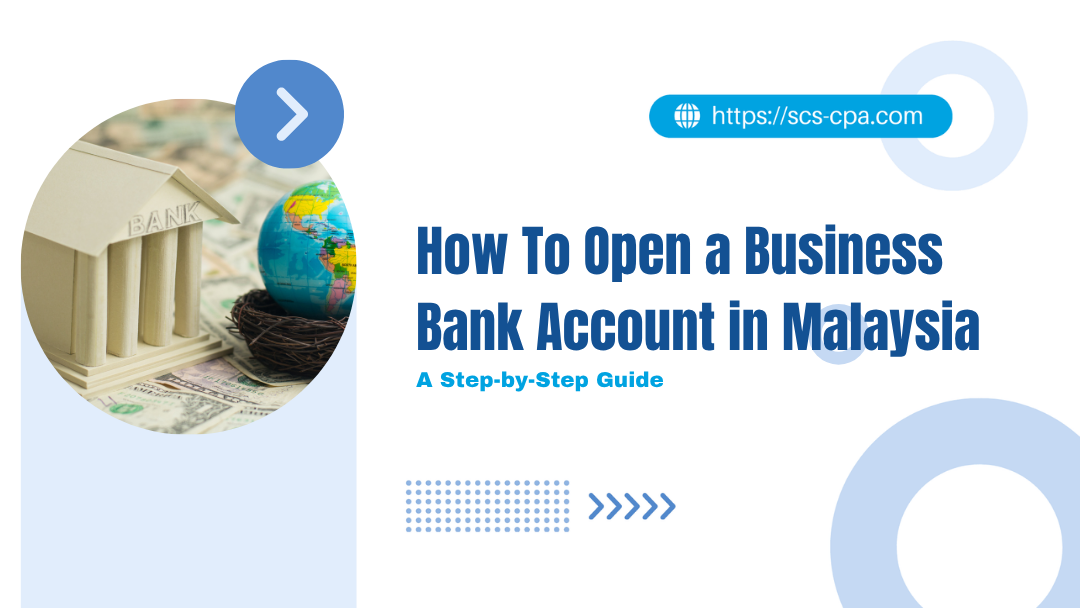
Setting up a separate bank account for your Malaysian business is important. It promotes financial integrity, legal compliance, and future growth. This guide explains how to set up a business bank account in Malaysia. It covers the types of accounts and the documentation process.
The Importance of a Business Bank Account in Malaysia
A dedicated corporate bank account is important for four main reasons in Malaysia.
- It helps build credibility by keeping your personal assets from the company. This is important for Limited Liability Partnerships (LLP) and Private Limited Companies (Sdn Bhd). Using the company’s name shows professionalism to suppliers, partners, and clients.
- It aids in financial management by making it easier to track income, expenses, and cash flow. This is necessary for good financial analysis and reporting.
- It ensures tax compliance: Having a business bank account helps you prepare financial statements. As such, it makes filing taxes with the Inland Revenue Board of Malaysia (LHDN) easier and more accurate.
- It supports legal compliance: Malaysia has a strong, well-regulated banking sector. It offers modern services through local banks, foreign banks, and Islamic banking options.
Types of Business Bank Accounts in Malaysia

Choosing the right account type is the first strategic step, as offerings vary significantly based on bank and business size.
Key Account Types
|
Account Type |
Best Suited For / Description |
|
SME Accounts |
Designed for newly incorporated companies or smaller businesses. Features lower initial deposit and minimum balance requirements, and simpler online banking facilities. |
|
Corporate Accounts |
Tailored for larger companies. These offer complex services like trade finance, overdraft facilities, treasury services, and dedicated relationship managers. |
|
Multi-Currency Accounts |
Essential for businesses dealing with international transactions (imports or exports). These accounts help to hold major foreign currencies (USD, SGD, EUR, etc.) and manage foreign exchange risk. |
|
Local Commercial Banks (e.g., Maybank, CIMB, RHB) |
Offer the most extensive branch and ATM networks, making them the most practical choice for day-to-day local transactions. |
|
Foreign Banks (e.g., HSBC, OCBC) |
Tend to focus on international trade and corporate banking. They appeal primarily to Multinational Corporations (MNCs) and foreign-owned entities. |
|
Islamic Banks |
Provide Shariah-compliant accounts that operate on principles like profit-sharing (Mudharabah) or cost-plus-profit (Murabahah). |
Eligibility Criteria and Required Documentation

The most complex part of the process is preparing the required documents. Malaysian law and the central bank (Bank Negara Malaysia) mandate these for Anti-Money Laundering (AML) and Counter-Financing of Terrorism (CFT) compliance. Here are the essentials you must know when preparing your application:
Mandatory Criteria
|
Requirement |
Details |
|
The company must be legally registered with the Companies Commission of Malaysia (SSM). This applies to all major structures: Private Limited Company (Sdn Bhd), Limited Liability Partnership (LLP), Sole Proprietorship, and Foreign Branch Office. |
|
|
Physical Address |
A valid, physical Malaysian business address is required. |
Primary Documents Required
Remember, documentation requirements vary slightly between banks. However, the core set typically includes documents that must be certified as true copies, including
|
Document Category |
Key Items Required |
Purpose |
|
Corporate Documents (SSM) |
Certificate of Incorporation (or equivalent), Certified true copies of Form 9, Form 24, and Form 49, Certified Company Constitution/Memorandum and Articles of Association. |
To verify the company’s legal existence, address, share capital, and director/shareholder structure. |
|
Director & Signatory Documents |
Certified true copies of NRIC (for Malaysian citizens) or Passport and a valid Visa/Work Permit (for foreigners). Proof of Residential Address (e.g., utility bill). |
To verify the identity and residency of those authorised to operate the account. |
|
Internal Authorisation |
Certified Board Resolution approving the opening of the bank account and detailing the specific account signatories. |
To prove that the decision to open the account was formally authorised by the Board of Directors. |
|
Compliance Documents |
FATCA (Foreign Account Tax Compliance Act) and CRS (Common Reporting Standard) declarations. Beneficial Ownership declaration (detailing who ultimately owns/controls the company). |
To comply with international tax transparency and anti-money laundering regulations. |
More reads: Corporate Advisory Services by SCS
How to Open a Business Bank Account in Malaysia

1. Pre-Application and Document Preparation
- Select Bank: Compare the service offerings, fees, and requirements of major banks (Maybank, CIMB, OCBC, HSBC, RHB, HLB).
- Prepare Certified Copies: Ensure all SSM documents are certified as true copies by the Company Secretary or a relevant professional.
- Pass Board Resolution: Draft and sign the Board Resolution formalising the account opening request and specifying the authorised signatories.
2. Application Submission (Online or Branch)
Most banks allow you to begin the application online or download forms. However, almost all banks still require the authorised signatories and directors to be physically present at a Malaysian branch for identity verification and document submission.
3. Vetting and Interview
The bank’s compliance team will vet all submitted documents. For companies that are foreign-owned or of complex structures, you may need to undergo a personal interview. This interview often involves deep AML/KYC scrutiny. The bank uses this interview to
- clarify the business nature,
- verify the source of funds, and
- Confirm that the business activities align with their risk appetite.
4. Account Activation
Once approved, you will be required to make the initial deposit (which can range from RM 500 to RM 5,000, depending on the bank and account type). Then, the account will be activated after the final submission and interview. This process is typically activated within 5 to 10 working days.
Common Challenges and Considerations
Successfully navigating the account opening process requires anticipating certain administrative and compliance hurdles.
- Varied Bank Policies: Different banks have widely differing appetites for risk, especially concerning foreign-owned companies. If one bank rejects your application, another might approve it.
- Local Representation: If all directors and signatories are based overseas, the bank may require a local representative. This person must often be a resident of Malaysia. The representative facilitates account opening and ongoing compliance. Banks are typically more stringent when dealing with non-resident directors and signatories due to heightened compliance risks.
- Digital Integration: Evaluate the bank’s digital platform. Ensure its online banking system can integrate seamlessly with your existing business financial software and accounting systems.
- Foreign Exchange Controls: Be aware of Bank Negara Malaysia’s foreign exchange rules. These rules restrict some cross-border transactions. They can also affect cash flow management for international businesses.
- Ongoing Compliance: Banks frequently update their Know Your Customer (KYC) requirements. Be prepared for unforeseen requests for updated documentation or declarations due to evolving regulatory standards.
Comparing Business Bank Account Packages in Malaysia

When selecting a bank, compare the features that directly impact your operational costs and efficiency. Here are several examples for your reference:
For Local Reach and General SME Needs
These banks offer the most extensive physical networks. Hence, they are ideal for traditional local businesses that rely on branch services and easy access.
|
Bank |
Initial Deposit (Approx.) |
Fees / Cost Structure |
Key Service Focus |
|
RM 1,000 |
Competitive, tiered structure based on balance/volume. |
Vast ATM/branch network, general deposits. |
|
|
RM 1,000 |
Competitive for SMEs with high transaction needs. |
Business financing, high-value SME loans, quick approvals. |
For Digital and Online-Focused Operations
These options are best suited for modern, tech-forward businesses and those prioritising seamless, paperless banking.
|
Bank |
Initial Deposit (Approx.) |
Fees / Cost Structure |
Key Service Focus |
|
RM 1,000 |
Often lower/zero fees for specified online transactions. |
Focus on fast, paperless digital account opening. |
|
|
RM 1,000 |
Low or waived fees for digital-only services. |
Cloud accounting integration, digital tools, seamless digital experience. |
For International Trade and Corporate Banking
If your business involves significant cross-border transactions, trade finance, or requires global support, these banks offer specialised expertise.
|
Bank |
Initial Deposit (Approx.) |
Fees / Cost Structure |
Key Service Focus |
|
RM 1,000 – RM 5,000 |
Competitive transactional fees. |
Cross-border transaction efficiency, liquidity management, regional focus (SG/China). |
|
|
Higher (Varies by package) |
Higher fees, compensated by global service access. |
Global banking, comprehensive import/export solutions, specialized trade finance. |
For Micro-SMEs and Low Entry Barriers
This option is suitable for very small businesses, micro-SMEs, and high-growth startups. Especially if you are seeking low minimum balance requirements and agile lending services.
|
Bank |
Initial Deposit (Approx.) |
Fees / Cost Structure |
Key Service Focus |
|
RM 500 – RM 1,000 |
Low maintenance fees for new accounts. |
Customised SME lending and advisory services, catering to high-growth startups. |
Key Factors When Choosing Your Business Bank
Your choice of bank should align with your business model and future growth trajectory.
- Service Offerings: If you rely heavily on imports and exports, prioritise a bank with strong trade finance, Letter of Credit (LC), and foreign exchange capabilities.
- Fee Structures and Hidden Charges: Read the fine print on account maintenance, interbank transfers, and international transaction fees.
- Digital Banking Innovation: Assess the quality, security, and functionality of their online and mobile banking platforms. These will be your primary interface for your business.
- Customer Support: Ensure dedicated business customer support is available, especially if you transact across multiple time zones or require complex assistance.
- Reputation and Stability: Choose a bank with a strong reputation and financial stability. Doing so helps protect and manage large amounts of capital.
Frequently Asked Questions (FAQs)

Can foreigners open a business bank account in Malaysia?
Yes, they can. Foreigners must first set up a company (Sdn Bhd or LLP) with SSM. They usually face stricter rules for documents and verification than local businesses. All foreign signatories need valid visas or work permits.
Is a physical office needed?
Yes, you must have a valid Malaysian business address registered with SSM to open a business bank account.
Can I open a business bank account 100% online?
Some steps can be done online. However, most major Malaysian banks require signatories and directors to visit a branch. This process serves as final identification checks and document certification due to strict AML/KYC rules.
Typical account opening timelines?
If all documents are complete and certified, the process will take time. It usually takes about 5 to 10 working days. This is the time from when you submit your documents to when your account is activated. Missing documents are the main reason for delays.
What if my business structure changes?
If there is a major change in the company structure, you need to update SSM first. This includes changes in directors, ownership, or signatories. Then, inform your bank right away. They will need a new Board Resolution and updated KYC documents.
Conclusion: The Value of Expert Guidance
The process of opening a business bank account in Malaysia is bureaucratic, but it is a vital administrative gateway. It allows you to operate legally and efficiently. Success depends on careful preparation, especially for SSM documentation and AML/KYC declarations.
Foreign-owned companies and those with complex structures face challenges. Navigating requirements such as local representation, board resolutions, and varying bank risk appetites can be challenging and time-consuming. Engaging a professional corporate service provider (CSP) or advisory firm can significantly streamline this process.
How Professional Advisory Firms like Singapore Corporate Services Can Help:
Treading Malaysia’s regulatory landscape can be overwhelming. Hence, a specialist firm helps greatly with:
- Pre-Vetting: Review your corporate structure and documentation before you approach a bank. This ensures maximum compliance and reduces the chance of rejection.
- Bank Recommendation: Advise on the most suitable Malaysian bank for your specific business needs (local operations, international trade, specific industry focus).
- Liaison: Act as a central point of contact between the company and the bank’s compliance team. This helps to expedite the application process and resolve documentation queries quickly.
- Holistic Support: Handle the entire incorporation process (SSM registration, company secretary services) and the subsequent bank account opening in one seamless engagement.
For expert assistance in Malaysian business incorporation and ensuring a smooth business bank account opening process, consider reaching out to the advisory team at scs-cpa.com.
Thinking of Expanding
You Biz?
Let’s connect and discuss
all the essentials!
How to Change Your Company Name in Singapore
A company's name can significantly shape its identity, yet there are times when a change becomes...
Is Singapore a Tax Haven? A Comprehensive Analysis
Is Singapore really a tax haven, or is it simply capitalising on tax policies that spur economic...
Fiscal Year vs Financial Year: Definitions and Implications
Is there a difference between a fiscal year and a financial year? While they both refer to the...



